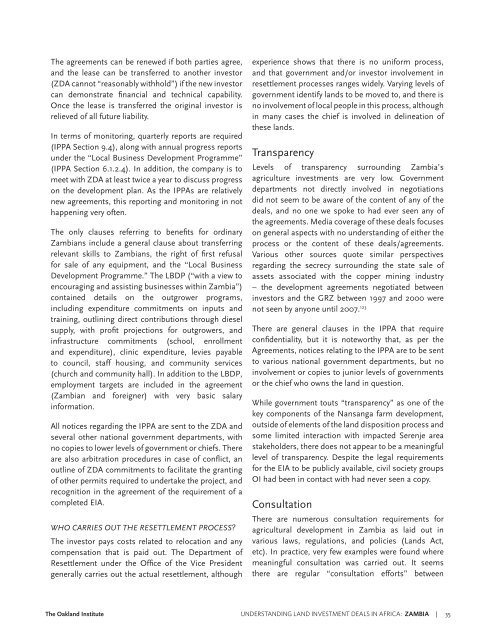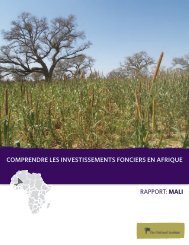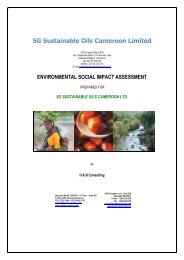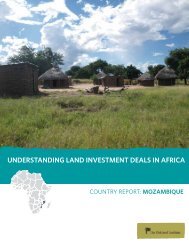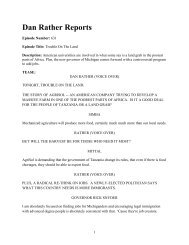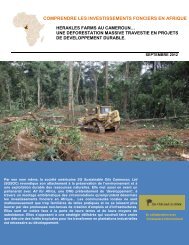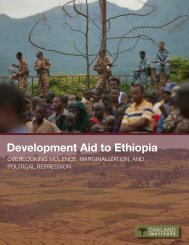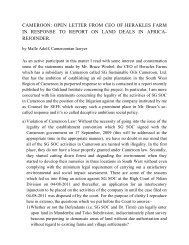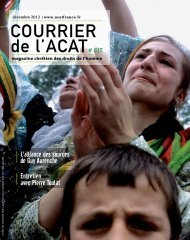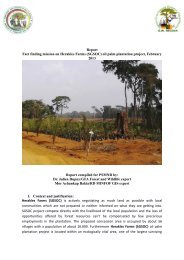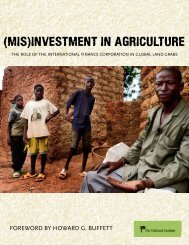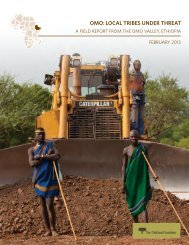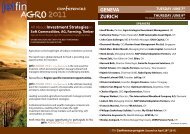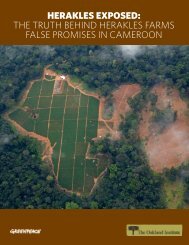Zambia - Oakland Institute
Zambia - Oakland Institute
Zambia - Oakland Institute
You also want an ePaper? Increase the reach of your titles
YUMPU automatically turns print PDFs into web optimized ePapers that Google loves.
The agreements can be renewed if both parties agree,<br />
and the lease can be transferred to another investor<br />
(ZDA cannot “reasonably withhold”) if the new investor<br />
can demonstrate financial and technical capability.<br />
Once the lease is transferred the original investor is<br />
relieved of all future liability.<br />
In terms of monitoring, quarterly reports are required<br />
(IPPA Section 9.4), along with annual progress reports<br />
under the “Local Business Development Programme”<br />
(IPPA Section 6.1.2.4). In addition, the company is to<br />
meet with ZDA at least twice a year to discuss progress<br />
on the development plan. As the IPPAs are relatively<br />
new agreements, this reporting and monitoring in not<br />
happening very often.<br />
The only clauses referring to benefits for ordinary<br />
<strong>Zambia</strong>ns include a general clause about transferring<br />
relevant skills to <strong>Zambia</strong>ns, the right of first refusal<br />
for sale of any equipment, and the “Local Business<br />
Development Programme.” The LBDP (“with a view to<br />
encouraging and assisting businesses within <strong>Zambia</strong>”)<br />
contained details on the outgrower programs,<br />
including expenditure commitments on inputs and<br />
training, outlining direct contributions through diesel<br />
supply, with profit projections for outgrowers, and<br />
infrastructure commitments (school, enrollment<br />
and expenditure), clinic expenditure, levies payable<br />
to council, staff housing, and community services<br />
(church and community hall). In addition to the LBDP,<br />
employment targets are included in the agreement<br />
(<strong>Zambia</strong>n and foreigner) with very basic salary<br />
information.<br />
All notices regarding the IPPA are sent to the ZDA and<br />
several other national government departments, with<br />
no copies to lower levels of government or chiefs. There<br />
are also arbitration procedures in case of conflict, an<br />
outline of ZDA commitments to facilitate the granting<br />
of other permits required to undertake the project, and<br />
recognition in the agreement of the requirement of a<br />
completed EIA.<br />
WHO CARRIES OUT THE RESETTLEMENT PROCESS<br />
The investor pays costs related to relocation and any<br />
compensation that is paid out. The Department of<br />
Resettlement under the Office of the Vice President<br />
generally carries out the actual resettlement, although<br />
experience shows that there is no uniform process,<br />
and that government and/or investor involvement in<br />
resettlement processes ranges widely. Varying levels of<br />
government identify lands to be moved to, and there is<br />
no involvement of local people in this process, although<br />
in many cases the chief is involved in delineation of<br />
these lands.<br />
Transparency<br />
Levels of transparency surrounding <strong>Zambia</strong>’s<br />
agriculture investments are very low. Government<br />
departments not directly involved in negotiations<br />
did not seem to be aware of the content of any of the<br />
deals, and no one we spoke to had ever seen any of<br />
the agreements. Media coverage of these deals focuses<br />
on general aspects with no understanding of either the<br />
process or the content of these deals/agreements.<br />
Various other sources quote similar perspectives<br />
regarding the secrecy surrounding the state sale of<br />
assets associated with the copper mining industry<br />
– the development agreements negotiated between<br />
investors and the GRZ between 1997 and 2000 were<br />
not seen by anyone until 2007. 123<br />
There are general clauses in the IPPA that require<br />
confidentiality, but it is noteworthy that, as per the<br />
Agreements, notices relating to the IPPA are to be sent<br />
to various national government departments, but no<br />
involvement or copies to junior levels of governments<br />
or the chief who owns the land in question.<br />
While government touts “transparency” as one of the<br />
key components of the Nansanga farm development,<br />
outside of elements of the land disposition process and<br />
some limited interaction with impacted Serenje area<br />
stakeholders, there does not appear to be a meaningful<br />
level of transparency. Despite the legal requirements<br />
for the EIA to be publicly available, civil society groups<br />
OI had been in contact with had never seen a copy.<br />
Consultation<br />
There are numerous consultation requirements for<br />
agricultural development in <strong>Zambia</strong> as laid out in<br />
various laws, regulations, and policies (Lands Act,<br />
etc). In practice, very few examples were found where<br />
meaningful consultation was carried out. It seems<br />
there are regular “consultation efforts” between<br />
The <strong>Oakland</strong> <strong>Institute</strong> UNDERSTANDING LAND INVESTMENT DEALS IN AFRICA: ZAMBIA | 35


